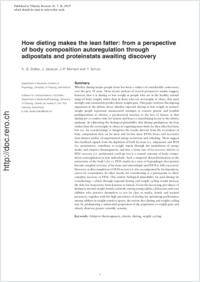How dieting makes the lean fatter: from a perspective of body composition autoregulation through adipostats and proteinstats awaiting discovery
- Dulloo, Abdul G. Department of Medicine, Division of Physiology, University of Fribourg, Switzerland
- Jacquet, Jean Department of Medicine, Division of Physiology, University of Fribourg, Switzerland
- Montani, Jean-Pierre Department of Medicine, Division of Physiology, University of Fribourg, Switzerland
- Schutz, Yves Department of Medicine, Division of Physiology, University of Fribourg, Switzerland
-
01.02.2015
Published in:
- Obesity Reviews. - 2015, vol. 16, p. 25–35
English
Whether dieting makes people fatter has been a subject of considerable controversy over the past 30 years. More recent analysis of several prospective studies suggest, however, that it is dieting to lose weight in people who are in the healthy normal range of body weight, rather than in those who are overweight or obese, that most strongly and consistently predict future weight gain. This paper analyses the ongoing arguments in the debate about whether repeated dieting to lose weight in normal-weight people represents unsuccessful attempts to counter genetic and familial predispositions to obesity, a psychosocial reaction to the fear of fatness or that dieting per se confers risks for fatness and hence a contributing factor to the obesity epidemic. In addressing the biological plausibility that dieting predisposes the lean (rather than the overweight or obese) to regaining more body fat than what had been lost (i.e. fat overshooting), it integrates the results derived from the re-analysis of body composition data on fat mass and fat-free mass (FFM) losses and recoveries from human studies of experimental energy restriction and refeeding. These suggest that feedback signals from the depletion of both fat mass (i.e. adipostats) and FFM (i.e. proteinstats) contribute to weight regain through the modulation of energy intake and adaptive thermogenesis, and that a faster rate of fat recovery relative to FFM recovery (i.e. preferential catch-up fat) is a central outcome of body composition autoregulation in lean individuals. Such a temporal desynchronization in the restoration of the body's fat vs. FFM results in a state of hyperphagia that persists beyond complete recovery of fat mass and interestingly until FFM is fully recovered. However, as this completion of FFM recovery is also accompanied by fat deposition, excess fat accumulates. In other words, fat overshooting is a prerequisite to allow complete recovery of FFM. This confers biological plausibility for post-dieting fat overshooting – which through repeated dieting and weight cycling would increase the risks for trajectories from leanness to fatness. Given the increasing prevalence of dieting in normal-weight female and male among young adults, adolescents and even children who perceive themselves as too fat (due to media, family and societal pressures), together with the high prevalence of dieting for optimizing performance among athletes in weight-sensitive sports, the notion that dieting and weight cycling may be predisposing a substantial proportion of the population to weight gain and obesity deserves greater scientific scrutiny.
- Faculty
- Faculté des sciences et de médecine
- Department
- Département de Médecine
- Language
-
- English
- Classification
- Dietetics, nutrition
- License
-
License undefined
- Identifiers
-
- RERO DOC 235595
- DOI 10.1111/obr.12253
- Persistent URL
- https://folia.unifr.ch/unifr/documents/304232
Statistics
Document views: 140
File downloads:
- pdf: 996
